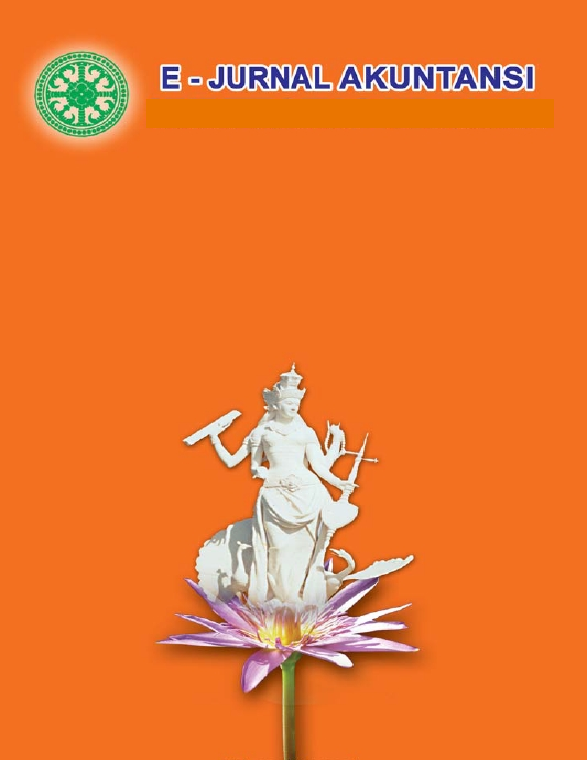Peran Moderasi Komite Audit pada Pengaruh Tenur, Rotasi Mandatori dan Rotasi Voluntari terhadap Kualitas Audit
Abstract
The debate about the enactment of the auditor partner rotation and audit tenure restriction and their effect on audit quality still leave questions, because several studies have found inconsistent results. This study aims to provide empirical evidence of the moderating effect of the audit committee on the relationship of audit tenure and auditor partner rotation on audit quality, which may have caused the inconsistency of several previous studies. This study uses data from manufacturing companies listed on the Indonesia Stock Exchange (IDX) for the 2017 to 2019 using moderated regression analysis (MRA). The results show that the audit committee has an important role in influencing audit quality because it significantly moderates the effect of audit tenure and mandatory rotation on audit quality. Those moderating effects tend to reduce audit quality, those effects are related to the role of the audit committee in monitoring the audit process.
Keywords: Audit Committee; Tenure; Voluntary Rotation; Mandatory Rotation.
Downloads
References
Alderman, J., & Jollineau, S. J. (2020). Can Audit Committee Expertise Increase External Auditors' Litigation Risk? The Moderating Effect of Audit Committee Independence. Contemporary Accounting Research, 37(2), 717-740. doi: https://doi.org/10.1111/1911-3846.12549
Azizkhani, M., Hossain, S., Jiang, A., & Yap, W. (2021). Mandatory Partner Rotation, Audit Timeliness and Audit Pricing. Managerial Auditing Journal, 36(1), 105-131. doi:https://doi.org/10.1108/MAJ-12-2019-2506
Baron, R. M., & Kenny, D. A. (1986). The Moderator-Mediator Variable Distinction in Social Psychological Research. Conceptual, Strategic, and Statistical Considerations. Journal of personality and social psychology, 51(6), 1173-1182. doi:https://doi.org/10.1037/0022-3514.51.6.1173
Bédard, J., & Gendron, Y. (2010). Strengthening the Financial Reporting System: Can Audit Committees Deliver? International Journal of Auditing, 14(2), 174-210. doi:https://doi.org/10.1111/j.1099-1123.2009.00413.x
Bilal, Chen, S., & Komal, B. (2018). Audit Committee Financial Expertise and Earnings Quality: A Meta-Analysis. Journal of Business Research, 84, 253-270. doi:https://doi.org/10.1016/j.jbusres.2017.11.048
Chen, K. Y., & Zhou, J. (2007). Audit Committee, Board Characteristics, and Auditor Switch Decisions by Andersen's Clients. Contemporary Accounting Research, 24(4), 1085-1117. doi: https://doi.org/10.1506/car.24.4.2
Collier, P., & Gregory, A. (1996). Audit Committee Effectiveness and The Audit Fee. European Accounting Review, 5(2), 177-198. doi:https://doi.org/10.1080/09638189600000012
Creswell, J. W., & Creswell, J. D. (2018). Research Design: Qualitative, Quantitative, and Mixed Methods Approaches-fifth edition (Fifth ed.): SAGE Publications, Inc.
Defond, M. L., Hann, R. N., & Xuesong, H. U. (2005). Does the Market Value Financial Expertise on Audit Committees of Boards of Directors? Journal of Accounting Research, 43(2), 153-193. doi: https://doi.org/10.1111/j.1475-679x.2005.00166.x
DeZoort, F. (1997). An Investigation of Audit Committees' Oversight Responsibilities. Abacus, 33(2), 208-227. doi:https://doi.org/10.1111/1467-6281.00012
Ferguson, A., Lam, P., & Ma, N. (2019). Further Evidence on Mandatory Partner Rotation and Audit Pricing: A Supply-Side Perspective. Accounting and Finance, 59(2), 1055-1100. doi:https://doi.org/10.1111/acfi.12269
Fitriany, Utama, S., Rossieta, H., & Martani, D. (2019). Analysis of Mandatory Audit Rotation Regulations in Indonesia. Paper presented at the Asia Pacific Business and Economics Conference (APBEC 2018).
Gani Damanhuri, A., & Dwiana Putra, I. M. P. (2020). Pengaruh Financial Distress, Total Asset Turnover, dan Audit Tenure pada Pemberian Opini Going Concern. E-Jurnal Akuntansi; Vol 30 No 9 (2020)DO - 10.24843/EJA.2020.v30.i09.p17. Retrieved from https://ojs.unud.ac.id/index.php/Akuntansi/article/view/59154
Gipper, B., Hail, L., & Leuz, C. (2021). On the Economics of Mandatory Audit Partner Rotation and Tenure: Evidence from PCAOB Data. Accounting Review, 96(2), 303-331. doi:https://doi.org/10.2308/tar-2018-0347
Gujarati, D., & Porter, D. (2009). Basic Econometrics (Fifth ed.): Mc Graw-Hill International Edition.
Hayes, A. F. (2018). Introduction to Mediation, Moderation, and Conditional Process Analysis A Regression-Based Approach Second Edition: The Guilford Press.
Horton, J., Livne, G., & Pettinicchio, A. (2020). Empirical Evidence on Audit Quality under a Dual Mandatory Auditor Rotation Rule. European Accounting Review, 30(1), 1-29. doi:https://doi.org/10.1080/09638180.2020.1747513
IFAC. (2015). International Standard on Auditing 260 (Revised) - Communication with Those Charged with Governance. Retrieved from https://www.ifac.org/system/files/publications/files/ISA-260-Revised_1.pdf
IFC. (2018). The Indonesia Corporate Governance Manual. Retrieved from https://www.ifc.org/wps/wcm/connect/e66bacdc-07c6-40f3-b094-8d3ca96a77a0/Indonesia_CG+Manual_2nd_Edition.pdf?MOD=AJPERES&CVID=mf8483z
Jensen, M. C., & Meckling, W. H. (1976). Theory of The Firm: Managerial Behavior, Agency Costs and Ownership Structure. Journal of financial economics, 3(4), 305-360. doi:https://doi.org/10.1016/0304-405X(76)90026-X
Jones, J. J. (1991). Earnings Management During Import Relief Investigations. Journal of Accounting Research, 29(2), 193-228. doi:https://doi.org/10.2307/2491047
Kalelkar, R. (2016). Audit Committee Diligence Around Initial Audit Engagement. Advances in Accounting, 33, 59-67. doi:https://doi.org/10.1016/j.adiac.2016.04.009
Khoo, E. S., Lim, Y., & Monroe, G. S. (2020). Audit Committee Members' Reputation Incentives and Their Effectiveness in Monitoring the Financial Reporting Process. Abacus, 56(3), 348-406. doi:https://doi.org/10.1111/abac.12201
Kothari, S. P., Leone, A. J., & Wasley, C. E. (2005). Performance Matched Discretionary Accrual Measures. Journal of accounting and economics, 39(1), 163-197. doi:https://doi.org/10.1016/j.jacceco.2004.11.002
Kuang, H., Li, H., Sherwood, M. G., & Whited, R. L. (2020). Mandatory Audit Partner Rotations and Audit Quality in the United States. Auditing: A journal of practice & theory, 39(3), 161-184. doi:https://doi.org/10.2308/ajpt-18-152
Lennox, C. S., Wu, X., & Zhang, T. (2014). Does Mandatory Rotation of Audit Partners Improve Audit Quality? The accounting review, 89(5), 1775-1803. doi:https://doi.org/10.2308/accr-50800
Martani, D., Rahmah, N. A., Fitriany, F., & Anggraita, V. (2021). Impact ff Audit Tenure and Audit Rotation on The Audit Quality: Big 4 Vs Non Big 4. Cogent Economics & Finance, 9(1), 1901395. doi:https://doi.org/10.1080/23322039.2021.1901395
Mautz, R. K. (1972). Toward A Philosophy of Auditing. 85-95. Retrieved from https://egrove.olemiss.edu/cgi/viewcontent.cgi?article=1026&context=dl_proceedings
Otoritas Jasa Keuangan. (2017). Peraturan Otoritas Jasa Keuangan Nomor 13/POJK.03/2017 tentang Penggunaan Jasa Akuntan Publik dan Kantor Akuntan Publik dalam Kegiatan Jasa Keuangan Jakarta
Sari, S., Diyanti, A., & Wijayanti, R. (2019). The Effect of Audit Tenure, Audit Rotation, Audit Fee, Accounting Firm Size, and Auditor Specialization to Audit Quality. Riset Akuntansi dan Keuangan Indonesia. doi:https://doi.org/10.23917/reaksi.v4i3.9492
Stewart, J., & Kent, P. (2006). Relation Between External Audit Fees, Audit Committee Characteristics and Internal Audit. Accounting & Finance, 46(3), 387-404. doi: https://doi.org/10.1111/j.1467-629X.2006.00174.x
Stewart, J., Kent, P., & Routledge, J. (2016). The Association between Audit Partner Rotation and Audit Fees: Empirical Evidence from the Australian Market. Auditing: A journal of practice & theory, 35(1), 181-197. doi:https://doi.org/10.2308/ajpt-51173
Watts, R. L., & Zimmerman, J. L. (1983). Agency Problems, Auditing, and The Theory of The Firm: Some Evidence. The Journal of Law and Economics, 26(3), 613-633. Retrieved from https://www.journals.uchicago.edu/doi/abs/10.1086/467051

This work is licensed under a Creative Commons Attribution-ShareAlike 4.0 International License.

















